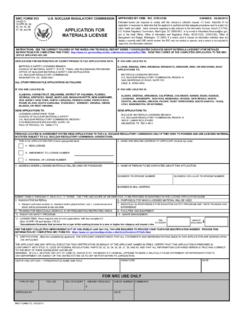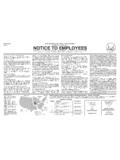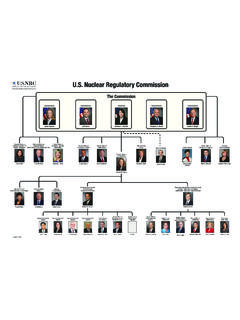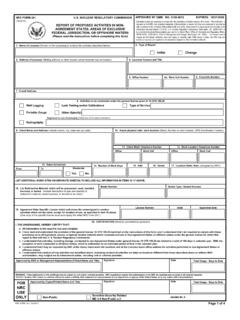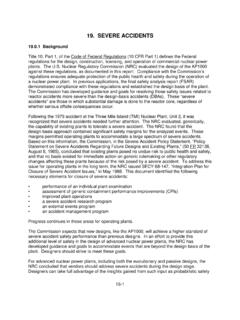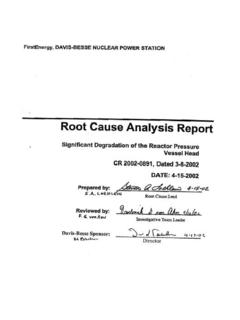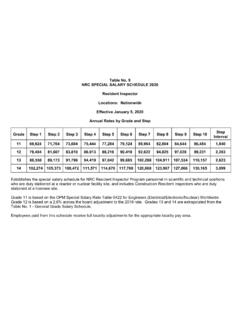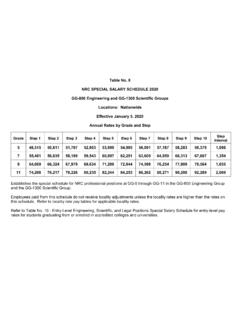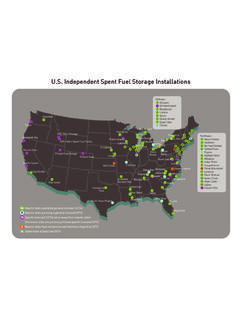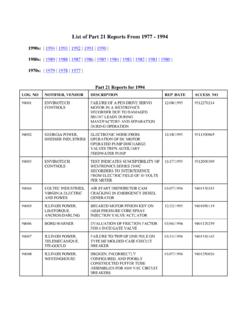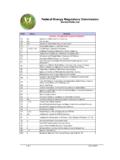Transcription of Station Blackout and Advanced Accident Mitigation (B.5.b ...
1 Station Blackout and Advanced Accident Mitigation ( ) OverviewPat Hiland, DirectorDivision of EngineeringOffice of Nuclear Reactor RegulationApril 28, 20112 Station Blackout Background WASH-1400, Reactor Safety Study, issued 1975, indicated that Station Blackout (SBO) could be an important contributor to the total risk from nuclear power plant accidents In 1980, the Commission designated the issue of Station SBO as Unresolved Safety Issue (USI) A-44, Station Blackout NRC issued the final SBO Rule (10 CFR ) on June 21, 1988 SBO Rule requires each plant to be able to cope and recover from an SBO eventStation Blackout Staff Evaluations NRC issued Regulatory Guide (RG) , Station Blackout , on August 1988 and endorsed NUMARC 87-00 industry guidance to implement the SBO Rule All 104 plants met the SBO rule requirements at the time of the staff s review Safety Evaluations Pilot Inspections License Renewal Application reviews -Staff verifies the scoping and aging management of systems, structures, and components required for SBO in accordance with 10 CFR (a)(3) and 10 CFR Blackout - New Reactors All new standard reactor designs must include an alternate ac (AAC) power source with diverse design to cope with an SBO for 8-hours New reactors with passive designs cope with an SBO with battery power for RequirementsNRC Imposed Requirements after the events of September 11, 2001 Interim Compensatory Measures Order EA-02-026 License Condition 10 CFR (hh)(2)510 CFR (hh)(2)
2 Each licensee shall develop and implement guidance and strategies intended to maintain or restore core cooling, containment, and spent fuel pool cooling capabilities under the circumstances associated with loss of large areas of the plant due to explosions or fire .. 6 Station Blackout Preparedness and CopingGeorge WilsonBranch Chief, Division of EngineeringOffice of Nuclear Reactor RegulationApril 28, 2011 SBO Rule Rule in Federal Register Loss of all alternating current power SBO Rule requires each plant to be able to cope and recover from an SBO event of specified duration NRC issued Regulatory Guide (RG) , Station Blackout , on August 1988 and endorsed NUMARC 87-00 industry guidance to implement the SBO Rule 8 SBO Coping Rule provided guidance on how to calculate the plant specific SBO duration. The coping duration based on following factors:-The redundancy of the onsite emergency ac power sources-The reliability of the onsite emergency ac power sources-The expected frequency of loss of offsite power -The probable time needed to restore offsite power SBO event ends when either offsite or onsite power is restored9 Coping Methods AC independent 44 plants rely on batteries only Maximum duration 4 hours Alternate AC 60 plants in this category Emergency Diesel Generators from adjacent unit with excess capacity Gas turbine generators, diesel generators and hydro units Appendix R Diesel generators10 Staff Review of SBO Rule Implementation NRC staff reviewed and approved by safety evaluations all 104 plants SBO submittals.
3 NRC staff conducted pilot inspections at 8 sites (2 per region) using NRC Temporary Instruction 2515/120 Inspection results revealed that the licensees were implementing the SBO Rule consistent with NRC requirements and staff s safety evaluations 11 Design Overview Battery coping plants - maximum coping duration is 4 hours Battery life may be extended to required duration by load shedding Effects of loss of ventilation. Condensate, compressed air and RCS inventories verified for adequacy Procedures developed for SBO Operator training12 SBO Procedures1. Specific actions for restoration of AC power2. Ensure support equipment functional without AC3. High priority on steam driven pumps RCS leakage paths13 Grid Interface Grid Interface Enhancements Grid operator evaluates network on daily basis Plant procedures for degraded grid conditions Plant controlled work in switchyard High priority for TSO to restore power New guidelines from NERC14 Summary Only one plant has had an SBO, it was in 1990 (App.)
4 1 hour) SBO compliance evaluated for License renewal Power uprates License amendment requests New Reactors Staff interfacing with FERC to maintain reliability with future changes in generation mix and transmission system upgrades. 15 Extensive Damage Mitigating Guidelines ( )Eric E. BowmanSenior Project ManagerDivision of Policy and RulemakingOffice of Nuclear Reactor RegulationApril 28, Strategies Details Designated Official Use Only - Security Related Information Flexible, Deployable Strategies Providing Alternate Means to Accomplish Key Safety Functions 17 Phased Approach Phase 1 Readily Available Materials and Personnel Phase 2 Spent Fuel Pools Phase 3 Core Cooling and Containment18 Phase 1 Readily Available Existing Programs & Equipment Best Practices from Initial Response Lessons Learned from Analyses19 Phase 1 Strategies Memoranda of Understanding Fire Fighting Enhancements Passive Measures20 Phase 2 - Spent Fuel Pool Cooling Make-up Water Cooling Spray Power Independence21 Phase 3 - Core Cooling and Containment Key Safety Functions Based on Plant SpecificsBoundary Conditions.
5 Loss of All Internal Power Distribution Minimum Staffing22 Utility of Strategies in SBO Entry Conditions More Conservative than SBO Use of Strategies Has Potential to Extend Duration for Supplying Key Safety Functions23 Acronyms Mitigating Strategies Requirements from Order EA-02-026, Section , the Subsequent License Conditions, and 10 CFR (hh)(2) SBO Station Blackout24
